James Burrows has
arguably given America more belly laughs over the years than anyone
else, and yet many people do not even know his name.
As arguably the
most prolific comedy director in television over the past five decades,
Burrows has shaped such classic series as The Mary Tyler Moore Show,
The Bob Newhart Show, Laverne & Shirley, Taxi, Cheers, Friends, Will &
Grace, Dharma & Greg, The Big Bang Theory, Two & a Half Men,
Mike & Molly
and many, many more.
In fact, with his
current, upcoming series Crowded, Burrows directed his 1,000th
episode of television. Actor and producer Sean Hayes, who worked with
Burrows during the eight-year run of Will & Grace, as well as on
the shorter-lived series Sean Saves the World, The Millers and as
a producer on Crowded, decided that it was well past time for Burrows'
career to be celebrated.
That celebration will
be in the form of Must See TV: An All-Star Tribute to James Burrows,
a two-hour special in which actors from the casts of many of
Burrows' classic series return to talk about working with the
behind-the-scenes comedy legend. The special has generated excitement
for reuniting the cast of Friends (though due to scheduling
problems, Matthew Perry has to appear via video), Taxi, Will & Grace
and many more.
A few weeks before
the special was to air, we were one of several media outlets lucky
enough to take part in a discussion with the legendary director.
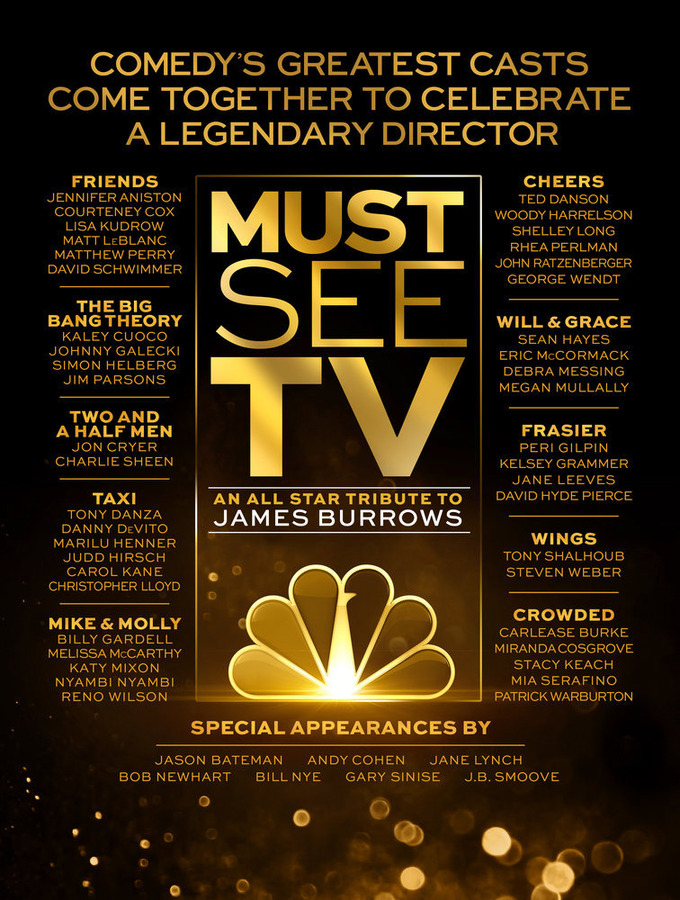 I was reading that
you first met Mary Tyler Moore when you were on the crew of the play
Holly Golightly. At the time did you imagine first that she would
play such a big part in your career? And second, that youíd be still
doing this after all these years?
I was reading that
you first met Mary Tyler Moore when you were on the crew of the play
Holly Golightly. At the time did you imagine first that she would
play such a big part in your career? And second, that youíd be still
doing this after all these years?
No. I had
absolutely no idea. I was the assistant to the Assistant Stage Manager
on the play. My father had written the play. It was actually a musical
of Breakfast at Tiffanyís. The two stars were Mary Tyler Moore
and Richard Chamberlain. I was literally in charge of them, since they
were Hollywood people. You know, making sure that they were okay and
taken care of and coming to the Broadway stage. So I met Mary. Under the
circumstances Ė the show was a big failure, never opened, played four
previews on Broadway, was a disaster Ė we were in this lifeboat
together. I became kind of friendly with Mary and Grant Tinker [her
then-husband and business partner]. But I had no idea back then that I
would ever end up in television.
You are the genius
behind some of the most iconic shows. What is it like for you seeing all
of the casts of many of your shows coming together to honor you and all
of your extraordinary works?
Well, Iím not the
sole genius behind it. And to call myself a genius... I canít really do
that. But thank you. The writing and the acting go into making a hit
show along with the directing. In my speech I gave them all credit
because theyíre all responsible for where I am. To see those casts in
the room starting with Taxi and ending with Crowded was,
like as I said, a good acid trip. It was just amazing to see all those
actors in one room at the same time. The comradery and the affection
that they had, not only for me but for the other actors in the other
shows was extraordinary.
You had a great
deal of success, some of the all-time TV classics. Iím wondering if you
ever think about the shows that didnít quite work out like
O.K. Crackerby!
which you had a role backstage on or The Associates which just
never caught on.
Well O.K.
Crackerby!, that was a show my father wrote. My father Abe Burrows.
I was Burl Ivesí dialogue coach on that. I didnít have much to do on
that. The Associates I did while I was doing Taxi. I did I
think two episodes of it. It was a wonderful show, just never got the
ratings. Back then, shows were cancelled if you had a 25 or 26 share.
You were cancelled because most of hit shows were doing 40 shares.
Thereís only one show that I did that I thought should not have been
cancelled and [should have been] extended because it was just a
wonderful show. It was called The Class. It was [created by]
David Crane and Jeffrey Klarik. A group of people who reunited at a
class reunion. I thought that was unjustifiably fast. Thatís the one
show Iím sad about.
Do you have a gut
feeling when you do pilots on shows, whether theyíre going to succeed or
not catch on in the ratings?
I do have a gut
feeling. I had a gut feeling about that. I really did because the
run-throughs and the show in front of the audience was just crazy. I
knew from the dress rehearsal of Cheers, Friends,
Frasier and Will & Grace how special those shows were. Even
The Big Bang [Theory] and Two and a Half Men. I have that
sense. But I was always disappointed about The Class.
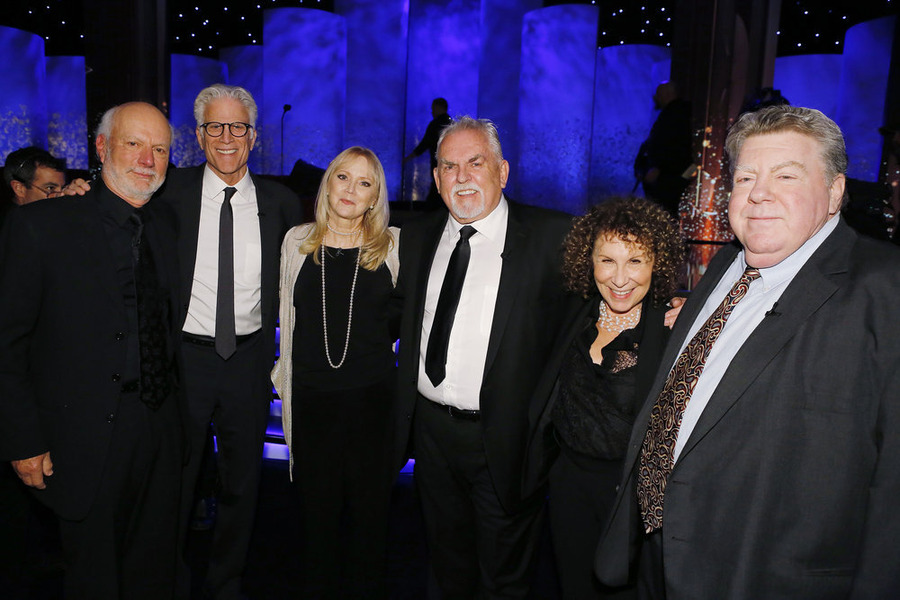 Having 1,000
episodes under your belt, which episode stands out most for you?
Having 1,000
episodes under your belt, which episode stands out most for you?
Oh, thatís such a
hard question. I have lots of children who are my favorite episodes.
Just a couple of them I think... Sam and Diane kissing at the end of the
first year of Cheers. Reverend Jim taking his driving test [in
Taxi.] Woodyís wedding [also in Cheers.] David Schwimmer and
the cat in Friends. Will, Grace, Jack and Karen all in the shower
together on Will & Grace. The first episode of Third Rock from
the Sun when these characters were exposed to the Earth. I mean
thereís so many. The pilot of Frasier is an extraordinary pilot.
So there are all these shows. I have many, many, many children who are
my favorite episodes, so I canít choose. You love all your children
equally.
Is there a story
that really sticks out for you from your career directing an episode?
Stories, no. I
mean the first year I did five episodes [of] The Mary Tyler Moore
Show, my first show. Of course that story is really how I got
started. It was not a very good script. Mary had brought me out from New
York to do one show, Mary and Grant Tinker. I did everything I possibly
could to make that show funny and to work. Iíll never forget Mary coming
to me before we shot the show and saying to me, "our investment in you
has worked out." I was blown away by that, even before the show was
shot. I think thatís my one episode story because that really kicked me
off.
What would your
ideal crossover be? Youíve done 1,000 episodes of all these different
series.
I always thought
it would be a good idea if Louie De Palma [Danny DeVito] came and sat at
the Cheers bar and met Rhea [Perlman, DeVito's real-life wife].
Youíve done
multiple episodes on some of the most legendary shows on television.
What was it about working on
Will & Grace
that kept you there for all eight seasons and directing every single
episode?
To me, that was
the funniest show Iíve ever done. It was a fairytale, literally and
figuratively. It was not of the real world in a strange way. These were
exaggerated characters. Although they were grounded with Will and Grace,
there was this exaggeration that made the stuff you could do and get
away with on that show so extraordinary. It made me laugh every day.
Every day of the week, every day we rehearsed. It was just crazy. It
made me feel young. I told my wife. I just do this show because it makes
me laugh all the time. Not to say Cheers didnít make me laugh or
anything like that. If I could have I would have done every episode on
Cheers. But Will & Grace was just this strange phenomenon
that tickled me pink every Tuesday night that we shot the show.
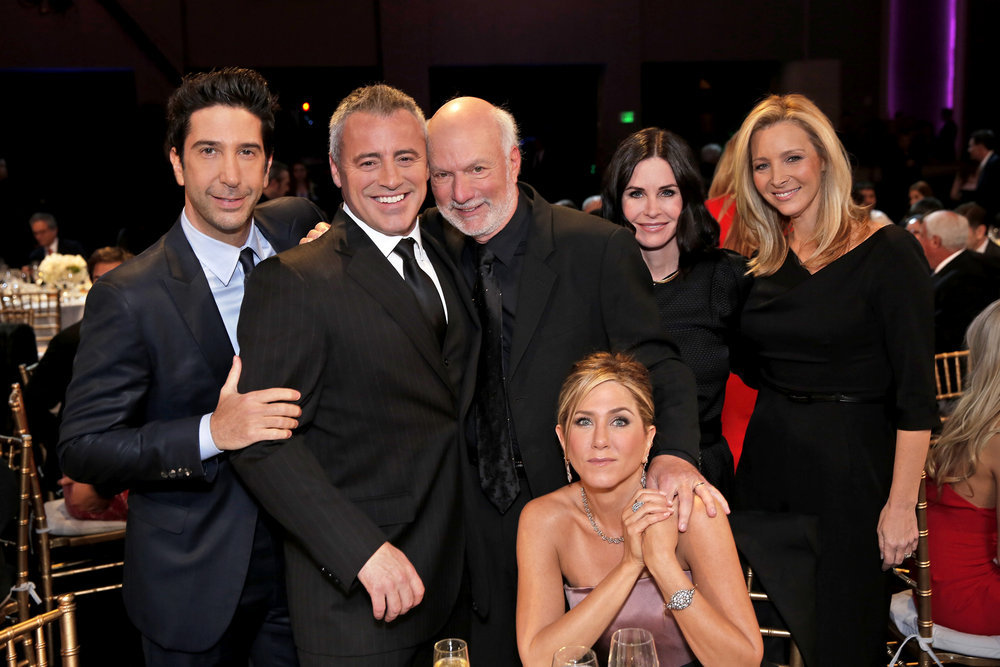 Could you tell us
a little bit about how the cast of
Friends grew
and changed from when you directed the pilot to your last episode, four
or five years later?
Could you tell us
a little bit about how the cast of
Friends grew
and changed from when you directed the pilot to your last episode, four
or five years later?
It didnít change
at all. It was the same six kids. The one change was the character of
Joey. Joey became not so stupid and more sophisticated, although you
didnít lose that angle on Joey because thatís what made him funny a lot
of times. Over the first four years they had grown into these enormous
stars and had not lost their ability, or grown an ego. They still were
and still are great friends. At the reunion when they did my special, it
was great to see all five of them together.
You have worked
for a long time in the multi-cam format, almost exclusively. What draws
you back to that? What do you like about filming in front of a live
studio audience?
Iím a theater rat.
I was born in the business. My father was Abe Burrows, who wrote Guys
and Dolls. Wrote and directed How to Succeed in Business
[Without Even Trying]. Wrote and directed Cactus Flower.
Thatís how I was brought up. He used to trundle me along to rehearsals.
I would absorb, not sitting there to learn, it would sink in while I
would dream and run around the theater and stuff like that. I started
directing shows in summer stock and directing shows at dinner theaters
and regional theaters. If you notice all these multi-camera shows,
theyíre all shot in front of a live audience. For me, the Tuesday or the
Friday night, whichever night it is we film, thatís opening night for
me. I know how to do that. I know how to handle that. Thatís inbred in
me. Thatís how I think. Thatís why I enjoy doing what I do.
With the
popularity of
Friends that
seemingly continues as strong as ever, can you imagine ever something
like what theyíre doing with Gilmore Girls, reviving the series?
Is that something that you think youíd like to be a part of?
I donít think you
should ever go back. I firmly believe in that. I created Cheers
along with the Charles Brothers. Weíre co-creators. They were gracious
enough to give me that credit. Theyíve talked to us about a Cheers
reunion for years. We donít want to do one. Itís just, we did that show.
That was that show. I donít think Friends... and I have no
control over this, David [Crane] and Marta [Kauffman] are the creators
and geniuses behind that show... I donít think theyíll ever want to do a
reunion. Itís what it was. It was a treasure in the history of
television. I donít think you want to revisit that.
Interesting. Is
there anything that viewers can expect when they see the
Friends cast
together during the special?
No. They
participated like all the other casts did. They had a question session
on a couch with a host, where they talked about what it was like working
with me. They do nothing other than what anybody else did in that
production.
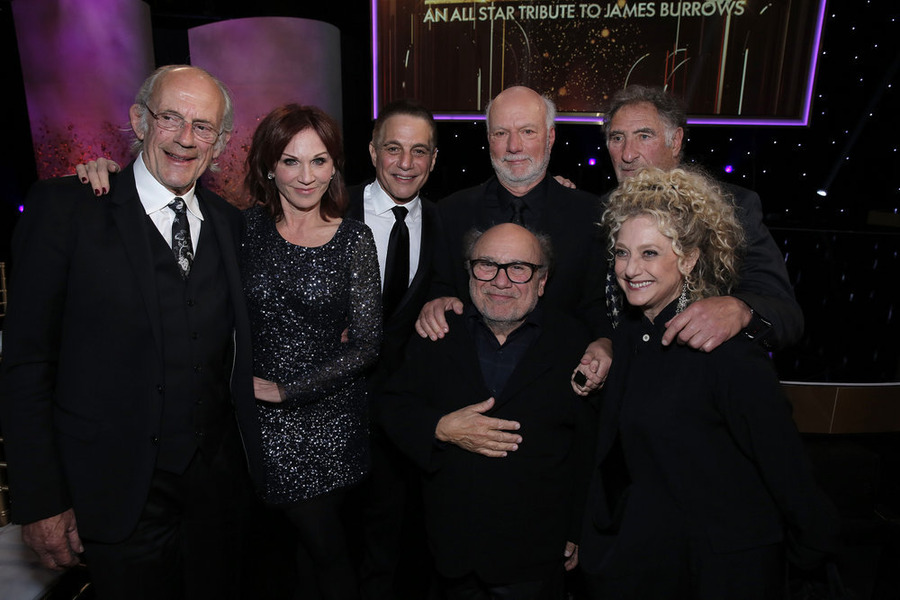 I just wanted to
get your take on people from all these shows being together in one
place. I assume some know each other, but some probably hadnít met. What
was it like having them all there and are there any meetings or mingling
that stand out in your mind from the evening?
I just wanted to
get your take on people from all these shows being together in one
place. I assume some know each other, but some probably hadnít met. What
was it like having them all there and are there any meetings or mingling
that stand out in your mind from the evening?
Well I know that
Reno Wilson [Mike & Molly] went to school with Jennifer Aniston.
I found that out. I did not know they both went to Performing Arts.
There were a lot of crossovers. I mean Danny DeVito knows most of the
people there. Schwimmer knew a lot of people there. It just was so
amazing when we went to commercial to see all these different people
from these different casts going over to talk to other people in other
casts. Again it was just an out-of-body experience. It went by fast. Iím
so happy that Sean Hayes had this idea.
There was a
picture of the
Friends and The Big Bang Theory casts together. It just looked
like these people had different experiences but in some ways probably
some similar experiences.
Yes, absolutely.
The popularity of both those shows is extraordinary. It was great to see
them hanging out with one another.
What is your take
on the network sitcom? Do you think itís here to stay or do you think
weíre going to see them going to streaming services such as Amazon and
Netflix?
Well, there are
certainly a lot more avenues now to do your shows than there were when I
started. There were only three venues, the three networks. Now there are
so many. You can do so many shows. However, the problem is that thereís
only a certain amount of writers. Comedy writers, Iím speaking
specifically about that. That doesnít change. Usually there are 60 to 75
really great ones. Now there are so many more venues. So you have people
doing shows that are not any good anymore for these particular venues.
You know, Iíve been around the death of comedy for a long time. Itís
always survived. Iíve been around the death of multi-camera for a while
and itís always survived. Itís a cyclical business. You need one good
show to revive the business. People need product. People need to laugh.
There will always be a market for comedy.
Do you have a
favorite bottle episode?
A favorite what
episode?
Bottle episode.
Bottle,
B-O-T-T-L-E?
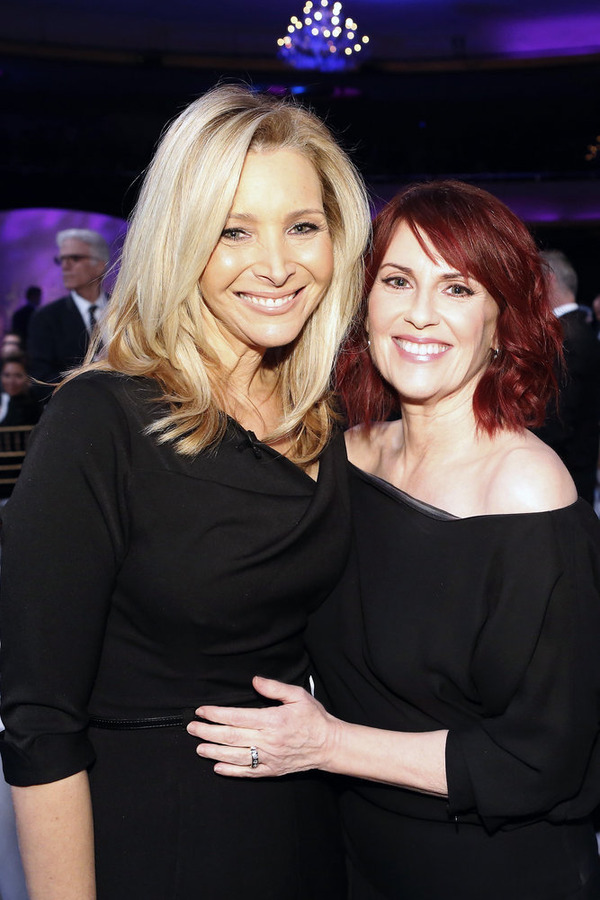 Yes. Where
everything takes place in the same location.
Yes. Where
everything takes place in the same location.
I never heard that
expression.
I listen to too
many podcasts I think.
Oh, okay. Well if
you watched the first year of Cheers, we never went outside the
bar so...
Yes, thatís right.
But do you have a favorite episode?
Wow. Iím hard
pressed to think. As I said the last episode of the first season of
Cheers is a bottle episode. It takes place in both in the bar and
Sam and Diane finally kiss. So I think thatís my favorite. Iíd have to
think. Iíd have to reference other shows. Right now my brain is not
going to those shows.
What appealed to
you about
Crowded? I watched the first episode and I really liked it.
The first thing
that always appeals to me is good writing. [Creator] Suzanne [Martin]
has a pedigree of Frasier. She was on Frasier when I was
around there. I know sheís a good writer. Sheís done Hot in Cleveland
and really, really good shows. She knows what she wants. To me itís
always about the writing. Then the concept comes into play, because
concepts are easy to come up with. The execution of the idea, the
execution of the concept, is hard. I always give the example of
Cheers, a show about a bar and a Tracy-Hepburn relationship. Not the
greatest ideas in a world, but itís the execution of the idea. So
Crowded appealed to me that way, with the writing and then with the
casting. I did nine out of the 12 episodes. The writing was always good
and the interactions with the characters were great. The ensemble feels
to me is really important in a show. Most of my shows, I think 99% of my
shows are always ensemble shows. Thatís what appeals to me, and then the
idea. I think a lot of the millennials are affected by this boomerang.
Thereís an expression. Somebody said to me bottle, so now I have a
boomerang expression I understand: where the kids go off, go to college
and move back in. I thought that was an interesting idea, but not as
much as that execution of the idea.
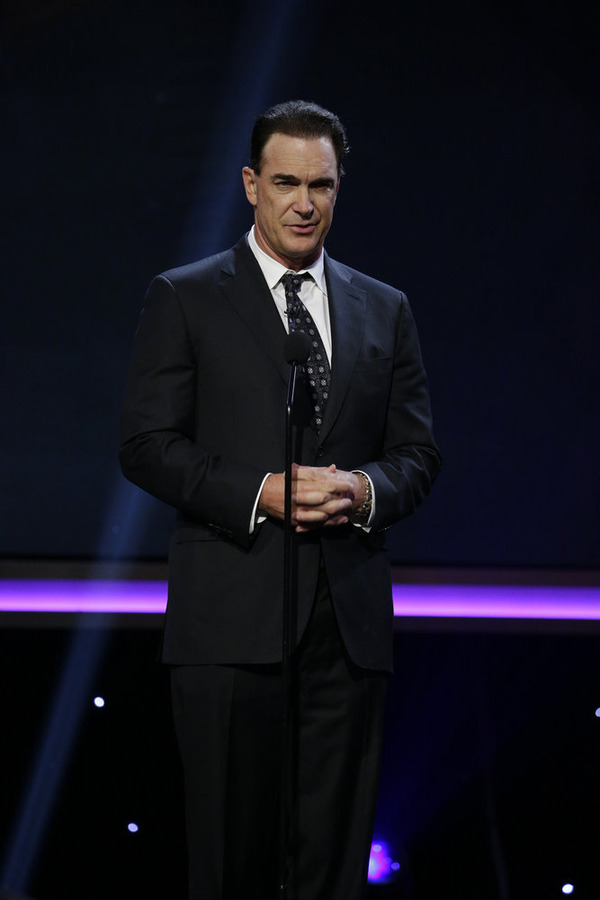 Can you talk about
the chemistry between Carrie Preston and Patrick Warburton? I thought it
was pretty great.
Can you talk about
the chemistry between Carrie Preston and Patrick Warburton? I thought it
was pretty great.
Yes. Yes. You know
Patrick is a wonderful actor who has a style that we all are familiar
with. But, on the show that style had to change. He had to be a bit
angry. He had to be a bit loose. Not that kind of thing that heís so
good at and so funny at. So he, and Carrieís reaction to that, and
Carrie being able to play off that, [it] was great. We had a lot of fun
in doing the show.
You mentioned your
father a couple of times. Do you think your skill in comedy is nature or
nurture?
Probably nature.
Oh yes. I donít think you can learn how to be funny. I think you have to
be born with that. Then it can be nurtured from there. But you got to
have the genes. I believe firmly that I got that from my dad. He then
again taught me how to deal with people because I worked for him a
couple of times as a stage manager. I saw how he behaved in rehearsal.
That was nurture with me. But the comedy instincts, I think you got to
be born with.
This question is
actually sort of a variation on the last question. As a comic TV
director, who were some of your inspirations and who do you feel you
learned the most from? Obviously like you said, you canít learn to be
funny. Just to be a good director. I know that for example Jay Sandrich
was an early mentor of yours.
Yes. Jay was a big
part of my development. When I first came out here I had to observe on
how multi-camera comedies were done. The theatrical part, staging, I
didnít have to learn. But I did have to learn how to move the cameras.
That you can only learn by watching. So I watched a lot of directors. I
watched Jay. From Jay I learned to have an opinion about something. Say
what you feel. Say what you think would make the show better. Donít just
be a traffic cop; donít just move the actors. Talk to the writers. Say
this is good. This is bad. This is how I would do this. Jay was great
with that. I learned so much from him. In this business, he was my main
mentor.
Youíve directed so
many beloved shows. But were there any shows out there that you really
respected and would liked to have done but just never were able to work
it out?
I wouldíve loved
to have done The Dick Van Dyke Show. Itís one of my favorite
shows. I wouldíve loved to have done Seinfeld. [Everybody
Loves] Raymond. I respect those shows. I loved Curb Your
Enthusiasm. I think those are the shows. I wish I had Norman Learís
brain. I donít think like Norman. But all of his shows, especially
All in the Family, just groundbreaking television. That was before
my time. But I respect that show and wish I was a part of it.
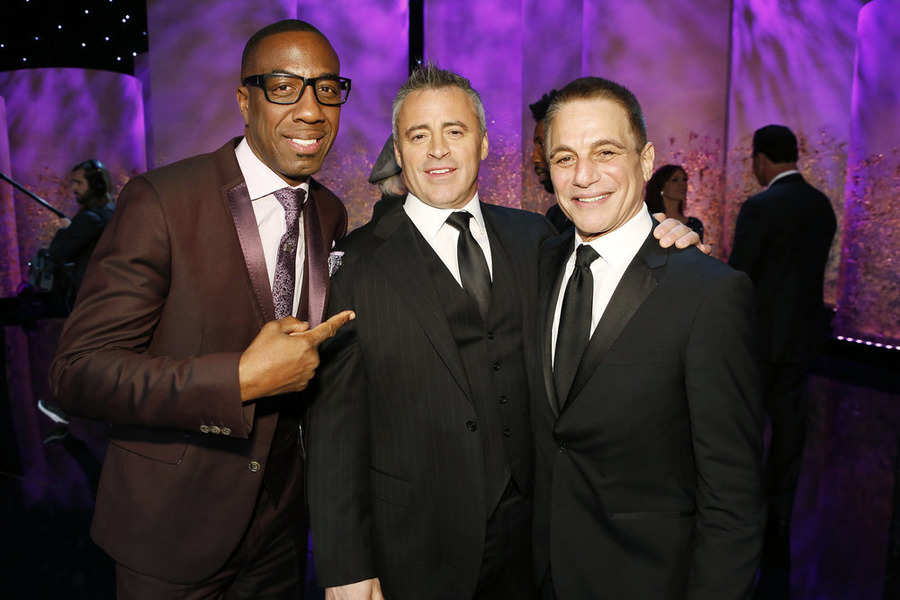 Every morning
people wake up and watch three of the shows you worked on,
Taxi, Mary Tyler Moore and The Bob Newhart Show. Those shows
are still in syndication 30, 40 years later. What advice do you have for
future directors for creating a show that could still last this long?
Every morning
people wake up and watch three of the shows you worked on,
Taxi, Mary Tyler Moore and The Bob Newhart Show. Those shows
are still in syndication 30, 40 years later. What advice do you have for
future directors for creating a show that could still last this long?
You never know
when youíre directing how long theyíre going to last. I have young
directors always come to me and ask me questions. Sometimes, if I have
time, I let them serve for a week. They always have the question: "What
do I have to do?" I said the hardest thing to do was not get your foot
in the door. The hardest thing to do is capitalize on the opportunity,
or be ready for the opportunity when you get the shot at directing. Itís
easier to get your foot in the door than it is to succeed at that moment
when youíre given the opportunity. Thatís the advice I give to people.
Be ready for when that opportunity happens. As far as getting in the
foot in the door, you got to knock on the door. I was lucky enough to
have worked with Mary Tyler Moore. But you have to keep knocking on
doors to try to get your foot in the door. Then if you can get your foot
in the door as a PA or a gopher then youíre around the action. You
express to people you want to direct. But if they give you that
opportunity you got to be ready for it.
Not only were you
ready for it but youíve obviously built a rapport. When I look at your
resume youíve done spinoffs of shows too. Itís like you did
Mary and then you did all the spinoffs [Rhoda and Phyllis].
And from Cheers you had Frasier. What is your advice to
keeping your foot in the door? How do you build this great rapport? The
fact that Sean Hayes has used you for his Hazy Mills sitcoms and is
doing this special for you. Whatís your secret? I mean besides being a
great director.
Oh, I think thatís
the number one thing. (laughs) I had no credibility in the
beginning. But I was lucky enough to be on the Mary Show. When
Mary said our investment in you had worked out, she had three or four
other shows on the air. She said to people, or Grant said, "Hereís a kid
who knows what heís doing. I think you should use him." So I went to
The [Bob] Newhart Show. I went to Phyllis. I went to Rhoda.
And you slowly built a reputation. For that to happen, you got to be
good. You got to know what youíre doing. Thatís something that again you
have to be born with. You have to have confidence in yourself.
Do you look back
at the person you were when you first started out on some of those
shows,
Mary, Bob Newhart and Taxi and shows like that. What bit of
advice do you wish you could impart to your younger self?
Well, I think I
kind of said it in the answer to the last question. Itís just you have
to have confidence in yourself. You have to bring something to the
dance. There are a lot of directors working now in television sitcoms
who are good directors but they donít either put enough of themselves
into the piece or create stuff or are [not] creative enough to
contribute to the piece. Thatís what you have to do. You have to not
only translate what the writers have written and stage that, but
contribute on your own. Which is one of the things I think I do. When I
started out, I was not worried about my next job. I was going to do the
best thing I could. [The] best show I could possibly do on this Mary
Tyler Moore and let the cards fall where they may. Because I kept
contributing to it, thatís why I have succeeded.
Email us Let us know what you think.